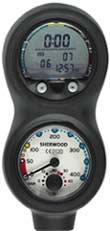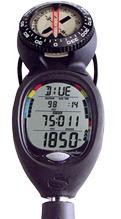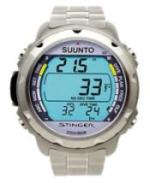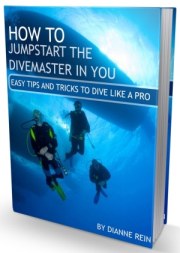Scuba Dive Computers:
Information on How to Buy a Diving Computer
Scuba dive computers can be a divers best friend.
I remember when I bought my dive computer (which is now a dinosaur at over 15 years old - but it is still going strong), it was a whole new world. You have so much more bottom time it is unbelievable. I could never go back to tables.
Traditionally, divers needed a depth gauge, dive watch and dive tables to have a safe dive.
With the advent of dive computers, all this information can be seen at a glance while underwater.
If you plan on doing any significant amount of scuba diving, this is definitely one piece of scuba diving equipment you want to have so you can enjoy more time underwater.
(You may also find our free computer buyers guide helpful; it has a complete list of all our pages and information on computers including our recommendations for best dive computers to buy.)
Scuba Dive Computers:
First Some Safety Advice
Notwithstanding the above, however, divers still need to use their common sense and knowledge when utilizing scuba dive computers.
You still must understand the basics of diving and dive safety rules - all of which should have been learned in your certification course(s). Although the dive computer may tell you that you can descend too 150 feet after some shallow dives, it probably wouldn't be wise to do so.

Dive computers are not infallible either so they should be used in conjunction with tables when planning a dive. A diver should have an idea of how long is safe at a certain depth so if his dive computer is not functioning properly, he will recognize it. Common sense rules.
In addition, some scuba dive computers are more liberal with their calculations of residual nitrogen than other computers. The user needs to understand where his computer falls in this regard and take it into account in his dive profile.
It is pretty foolhardy to push most scuba dive computers to the limit.
Our dive computer is pretty liberal so we always adjust the amount of safe time remaining at a depth. No matter what the computer is telling us, we typically subtract at least 5 minutes from our safe time at that depth.
Obviously this is more critical at deeper depths since you have less time allowed. I would suggest doing research online or talking with the computer dealer or rep to see where your computer falls in this regard and make your own adjustments from there if necessary.
Scuba Diving Computers:
Background on Dive Tables vs. Dive Computers
If you dive with a computer, you will be able to enjoy more time underwater than if you were diving just with tables.
With dive tables, the table assumes you were diving at your deepest depth for the whole length of the dive.

Of course, this isn't true as the diver descends, dives at max depth, dives a bit shallower, ascends, does safety stops, etc. Thus the tables present a more conservative dive profile and projects a higher level of nitrogen in the body than if the various depths the diver was at were taken into consideration.
Enter the dive computer. Scuba dive computers adjust for the depth and time of the dive as it calculates the level of nitrogen in the body.
The computers work on a mathematical algorithm to calculate gases in the body based on the diver's depth and time underwater. It thus allows the diver more bottom time compared to diving straight from the tables.
The diver is able to ascend to stay within the no decompression limits during the dive. While you can plan a multi-level dive with tables, execution is much easier and flexible with a computer.
Scuba Diving Computers:
Information Given on the Display
Dive computers have made great advances over the years. You can buy dive computers to tell you just about everything it seems - including how long to cook your turkey!
But all dive computers will tell you at least the same following basic information:
- Amount of time underwater
- Maximum depth
- Current depth
- Safe time remaining at that depth
- No decompression time limits by depth for your next dive
- Alarm or signal - Most computers will alert you (either audibly or visually) if you are ascending too fast or need a decompression stop.
- Surface interval time
- Time to fly - how long you need to wait before flying
- Water temperature
Many basic computers will also tell you:
There is alot of additional information some scuba dive computers can tell you. You need to decide what information is important for you and what is appropriate for the type of diving you do.
What is right for one diver may be totally useless to another diver.
Here are some questions you should ask to help you choose the appropriate computer for you:
Questions to Ask Before
Choosing and Buying Your Computer
- How much money do you want to spend?
- What information does the computer display (basic display information is listed above)?
- Does the computer automatically turn itself on and off? If you are the forgetful type, this is a nice feature. My computer doesn't and once I had to come back to the surface after starting my descent to turn it on. Luckily, I was only a few feet down. This is now one of our (my husband and I) standard pre-dive check questions.
- What type/style of computer do you want? Wristwatch style, console, hose mount or clip-on? Check out our page on types and styles of dive computers for more information.
- Can you easily read the information? And understand the display? Are the buttons easy to use, especially if you typically wear gloves while diving?
- How many dives does the computer log? The last 10 dives seems to be typical on some entry level models. Ours is an older model and only keeps track of our last dive so we have to write the information down if we do more than 2 dives a day. It's fine for us but it would drive some people crazy.
- Does the computer keep track of your dives if you have to change the battery in a middle of a dive trip? Or will you have to stay out of the water for 24 hours if the battery fails? More important if you take a number of dive trips per year or frequently do multi dives per day.
- Is the computer backlit? Especially important if you do night diving, cave diving, wreck diving, etc.
- Do you want an air integrated computer? If so, do you want it on a hose or would you prefer a wireless setup? Check out this page on scuba diving computers types and styles for more information.
- Do you want Nitrox capabilities (or think you may want it sometime in the future?) Even if you don't dive with nitrox now, if you think you might want to in the future, you probably should buy a dive computer with this capability. It doesn't add a whole lot to the cost and it could save you money in the future.
- What type of battery does it use? Can you change the battery or does it have to be sent back to the manufacturer? How long does the battery typically last? See our page on dive computer batteries for more information.
- What type of algorithm does the computer use to calculate decompression? Is this conservative or liberal?
- Do you want to be able to upload your dive information to a PC? Do you have to purchase a separate item to utilize this feature? While this is becoming a more commonplace feature, not all scuba dive computers have this capability so be sure to check.
- Is it good for altitude diving (if you plan on this type of diving)?
- What type of warranty does the dive computer have? Is there someone local that can service it?

These are some of the things to consider before choosing between scuba dive computers.
It can be a sizable investment so you want to make sure the dive computer you buy is the best one for you. After all, if you are not going to use all the capabilities (such as uploading to a PC) there is no sense in paying for them. A little time spent now can pay off big in the future.
For more information, take a look at our other pages on dive computers:
Best Dive Computers//Scuba Diving Computer Introduction //Dive Computer Types and Styles / Logs, Software, Price and More //Dive Computer Battery
Looking for other scuba equipment and accessories? Check out all our picks for best diving gear.
Have a safe dive!
Want to stay down longer and improve your buoyancy control and other diving skills? Our free report "Increase Your Bottom Time" along with our practical, weekly actionable tips will have you looking like a seasoned diver in no time. So come join us and see improvement on your very next dive!
(Click on the photo to join us now!)
What's New
-
Unofficially Summer
May 25, 24 07:19 AM
Well it is finally here. Memorial Day weekend and the unofficial start of summer! Wishing everyone a happy and healthy holiday weekend. Hopefully the weather cooperates wherever you are and you will b… -
Happy New Year
Jan 01, 24 06:00 AM
Happy New Year everyone! I hope everyone is well and had a fun New Years Eve! May your new year be filled with lots of wonderful dives. All the best to you and yours in 2024! Let the dives begin. -
Happy Holidays
Dec 14, 23 05:05 AM
I hope everyone is enjoying the holiday season! I am always amazed at how fast time flies and another year is just around the corner. I wanted to pop in and say hi to everyone. I am doing some full ti… -
3 Common Scuba Diving Mistakes New Divers Make
Feb 23, 23 02:18 PM
In this video, I share 3 common scuba diving mistakes beginner divers make. Learn how to correct these for a better - and safer - dive. -
Scuba Diving Tipping Etiquette: How Much And When To Tip Scuba Crew
Feb 06, 23 03:34 PM
Not sure of scuba diving tipping etiquette? In this video I share who to tip, when to tip, how much to tip, tipping on liveaboards, tipping an instructor & more











New! Comments
Have your say about what you just read! Leave me a comment in the box below.